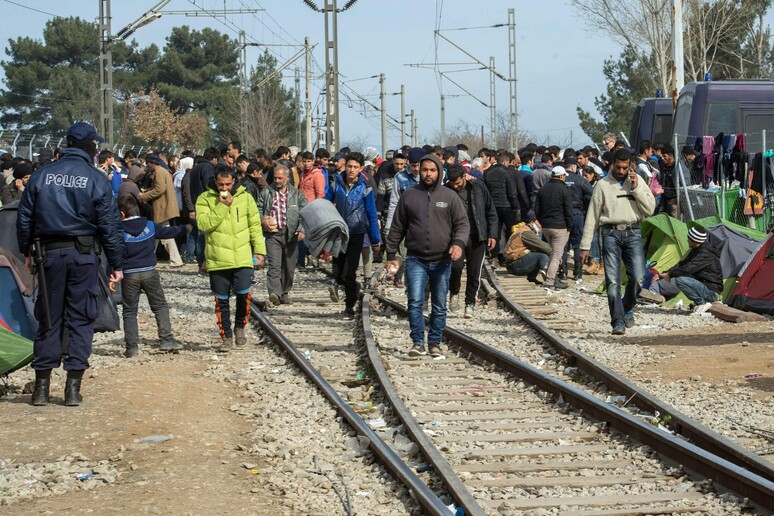A humanitarian vessel carrying 234
migrants, including 57 children, hovered for nearly three weeks
in international waters. Eventually, the Ocean Viking, a ship
sailing under the Norwegian flag and operated by French NGO SOS
Méditerranée, was redirected to Toulon in France after Rome
refused access to Italian ports. The incident caused a
diplomatic spat between Italy and France.
"We have to keep in mind that a clear majority of the people
arriving via this central Mediterranean route today do not need
international protection," said Ylva Johansson, EU Commissioner
for Home Affairs. Many of these migrants mainly came from Egypt,
Tunisia and Bangladesh and wanted to find a paying job in the
EU, she added.
The bloc has struggled for years to agree on how to share out
arriving migrants and asylum seekers. Ahead of the Extraordinary
Justice and Home Affairs Council of November 25, 2022, the
European Commission presented an Action Plan on the Central
Mediterranean, proposing a series of measures to address the
ongoing challenges along the route. This action plan aims to
curb illegal migration across the Mediterranean Sea and to
strengthen the solidarity and responsibility of the Member
States. Cooperation with countries of origin and transit is to
be intensified, irregular and unsafe migration is to be
discouraged, and solutions in the area of search and rescue are
to be offered. The Commission announced that similar action
plans will be developed for migration routes across the Eastern
Mediterranean and the Western Balkans.
According to Commissioner Johansson, the action plan also seeks
to accelerate the implementation of the solidarity mechanism,
which was agreed upon by 19 EU member states in June of this
year. Under this agreement, member states are to take in 8,000
refugees rescued on beaches or off the Mediterranean coasts of
the southern EU member states.
But the dispute between France and Italy has already threatened
the agreement. The new right-wing government in Rome would
prefer not to allow private rescue ships carrying migrants to
enter Italian ports at all. In retaliation, Paris said it would
no longer take in 3,500 migrants from Italy and urged other EU
countries to suspend their participation in the EU's migrant
relocation mechanism and adopt similar measures. The new
right-wing government in Rome stated that some NGO ships were
violating international law. Meanwhile, on November 18, France
denied entry into the country to 123 out of the 234 migrants of
the Ocean Viking. On November 25, EU interior ministers will
also hold crisis talks to head off this controversy.
The issue of refugee distribution
In a joint statement, Italy, Greece, Cyprus and Malta criticized
other member states for not doing enough to share the burden of
asylum seekers. They said only a small proportion of the
migrants arriving in the four countries were being relocated
under the current European system. According to the commission,
only 117 migrants have been redistributed under the voluntary
solidarity mechanism so far. The plan calls for 8,000
resettlement pledges to be fulfilled by the end of June 2023.
Italy's interior minister, Matteo Piantedosi, said that for his
country the solidarity mechanism had delivered "absolutely
insufficient results." He added that other states were not
prepared to take on responsibility when ships with nearly 1,000
rescued migrants on board waited for days off the Italian coast
for a port to be assigned. He cautiously welcomed the EU plan
and stressed the importance of reviving the migrant distribution
plan agreed upon in June.
European Commission spokeswoman Anitta Hipper stated that there
was a "clear, unequivocal obligation" to rescue people in danger
at sea and no difference should be made between NGO ships and
other vessels.
For Spain, the European Mediterranean countries have already
demonstrated their flexibility when it comes to the
implementation of effective procedures to help tackle irregular
migration, improve returns and ensure better asylum system
support. With regard to the voluntary solidarity mechanism,
Spanish Interior Minister Fernando Grande-Marlaska said that the
system should be predictable, so that each country would be able
to anticipate the obligations it had to meet. According to
Spain, the only way to effectively manage migration flows in the
long run is close cooperation between the countries of origin,
transit and destination.
Germany and Belgium record high numbers of arrivals
German Ambassador to Rome Viktor Elbling commented in a Tweet on
November 11: "Italy does a lot in terms of migration but it is
not alone: 154,385 asylum seekers in Germany in the period
Jan-Sep 2022, 110,055 in France, 48,935 in Italy. They are
respectively 0.186 percent of the German population, 0.163
percent of the French population and 0.083 percent of the
Italian population."
ALL RIGHTS RESERVED © Copyright ANSA











